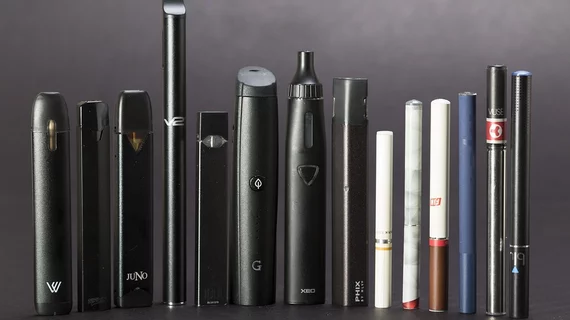Surgeon General declares teen vaping a national ‘epidemic’
U.S. Surgeon General Jerome Adams, MD, issued a rare national advisory Dec. 18 deeming youth e-cigarette use an “epidemic” in the country.
“I do not use that word lightly,” Adams said at a press conference. “Now is the time to take action. We need to protect our young people from all tobacco products, including e-cigarettes.”
Adams’ declaration comes just a day after the University of Michigan released its Monitoring the Future Survey—a study that found vaping rates among middle- and high-schoolers are at a record high and climbing—and follows months of cautionary reporting from governmental and scientific agencies. While e-cigs were first marketed to adults as an alternative approach to quitting smoking, trendy brands like Juul quickly gained traction among the younger crowd.
According to Adams, more than 3.6 million adolescents in the U.S. use vaping products in 2018, with one in five high schoolers admitting to e-cigarette use and one in 20 middle schoolers reporting the same.
The surgeon general singled out Juul in his advisory, noting the company's USB-shaped device enjoyed a 600 percent surge in sales between 2016 and 2017 as more adolescents flocked to its slim, hideable design. Juul announced mid-November it would be suspending retail sales of most of its flavored “pods,” which contain about as much nicotine as a 20-pack of cigarettes, and shutter its social media. Still, just two weeks later, the Wall Street Journal reported the company might be partnering with Altria, the world’s largest cigarette company.
“We must take aggressive steps to protect our children from these highly potent products that risk exposing a new generation of young people to nicotine,” Adams wrote in his advisory. “The bad news is that e-cigarette use has become an epidemic among our nation’s young people. However, the good news is that we know what works to effectively protect our kids from all forms of tobacco product use, including e-cigarettes.”
Adams called on multiple parties to step up in the fight against vaping, but his messages to parents, physicians, teachers and state leaders all start the same way: “You have an important role to play in addressing this public health epidemic.”
Though his suggestions were vague, Adams released a tip sheet for parents, emphasized the importance of self-education about the risks of tobacco and recommended everyone stay tobacco-free to set an example for kids. For states, communities, tribes and territories, he requested governmental bodies implement strategies to curb e-cigarette use in young populations, possibly even banning their use indoors and implementing price policies.
Adams’ statement is the latest in the U.S. government’s fight against nicotine addiction. In September, FDA Commissioner Scott Gottlieb, MD, announced “the largest coordinated tobacco compliance effort” in the agency’s history, which was accompanied by more than 1,300 warning letters and fines to retailers who were illegally selling Juul and other e-cigs to minors.

